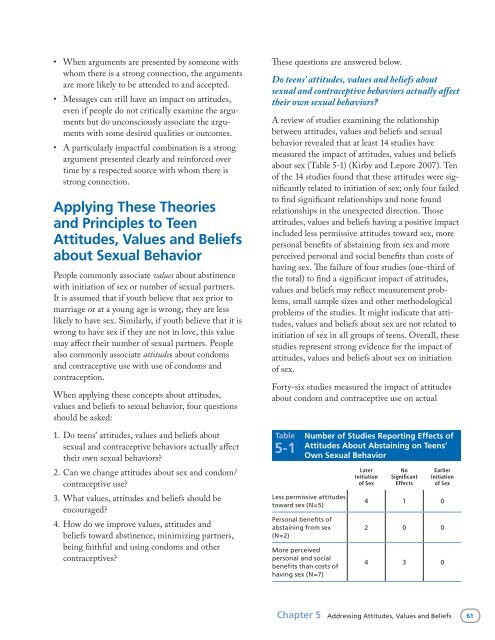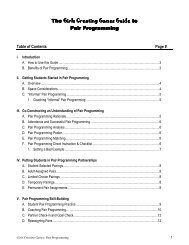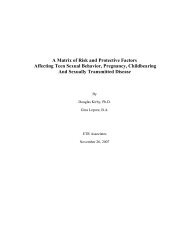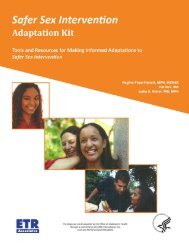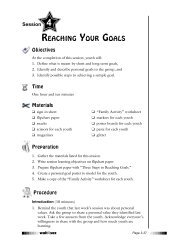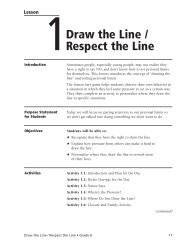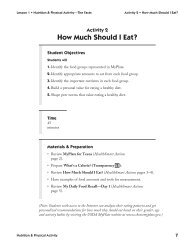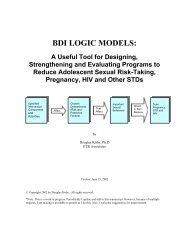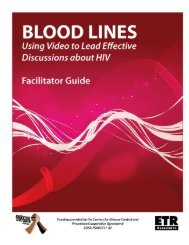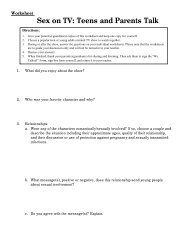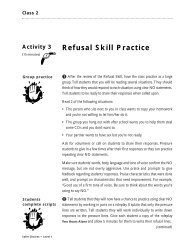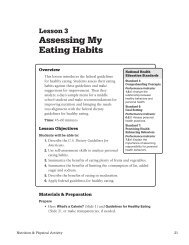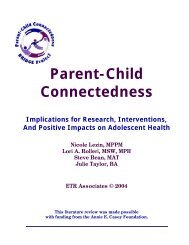field (e.g., psychology versus marketing), there aredifferent numbers of stages. However, many of theminclude the following steps during attitude change(McGuire 1999):1. Being exposed to a message or intervention2. Paying attention to a message or intervention3. Comprehending the arguments or message4. Accepting the argument or message5. Integrating the argument into existing beliefs6. Eliciting positive or negative thoughts about thenew or revised beliefs7. Retaining the attitudeThese steps in attitude change may take place veryquickly, perhaps within minutes or seconds, but arestill important because they constitute a set of concernsthat each intervention needs to address. Thatis, the intervention should make sure that the targetpopulation is exposed to the message, pays attentionto it, comprehends it, accepts it, integrates it, feelsgood about it and retains it.Use of fear in messages to change attitudes andvalues. Although there has been some debate aboutthe impact of fear in messages, there may be a growingconsensus about its effects. If messages do notincrease fear of possible negative consequences at all,then they may not be effective. If messages increasefear too much without providing a clear method ofavoiding the feared outcome, then fear may causepeople to ignore the message or to become paralyzedwith inaction. What is most effective is a reasonablecombination of fear arousal, presented with clear,achievable directions for how to avoid the negativeoutcome (Witte and Allen 2000).Use of cognitive dissonance. In psychology, cognitivedissonance is an uncomfortable feeling or stresscaused by holding two contradictory attitudes, valuesor beliefs simultaneously. The theory of cognitivedissonance proposes that people have a naturaldesire to reduce this dissonance by modifying oneor more of the existing attitudes, values or beliefs(Festinger 1957). Thus, one effective way of changingattitudes is to demonstrate that specific attitudesare inconsistent with more fundamental and importantvalues or attitudes, e.g., demonstrating thathaving unprotected sex is inconsistent with valuesand goals involving higher education and employmentbefore parenting.Summary of Principles• Attitudes that result from thoughtful criticalexamination of arguments new to an individualtend to be stronger, last longer, be more resistantto change and have a greater impact on behaviorthan do attitudes that result from little or nothought.• When people are more able and motivated toconsider new arguments, they are more likely tothoughtfully consider them.• Creating desired environmental conditions (e.g.,lack of distractions or disruptions) can increasepeople’s ability to thoughtfully consider newarguments.• When issues are considered personally relevant,attitudes have a greater impact on behavior.• When arguments reveal inconsistencies betweendeeply held attitudes and values on the one handand behavior on the other, the arguments aremore likely to lead to behavior change.• When arguments are appropriate for the stage ofchange, they may be more effective.• Tailoring can increase the ability and motivationto thoughtfully process a message and to accept it.It also can focus more precisely on those attitudesthat most need to be changed.• Including strong arguments in messages isimportant.• Both arguments and messages should be pilottested to see which are strongest for particulargroups.• When arguments are presented by someone withaccepted expertise and respect, they are morelikely to be considered and accepted.60 <strong>Reducing</strong> <strong>Adolescent</strong> <strong>Sexual</strong> <strong>Risk</strong>: A <strong>Theoretical</strong> Guide for Developing and Adapting Curriculum-Based Programs
• When arguments are presented by someone withwhom there is a strong connection, the argumentsare more likely to be attended to and accepted.• Messages can still have an impact on attitudes,even if people do not critically examine the argumentsbut do unconsciously associate the argumentswith some desired qualities or outcomes.• A particularly impactful combination is a strongargument presented clearly and reinforced overtime by a respected source with whom there isstrong connection.Applying These Theoriesand Principles to TeenAttitudes, Values and Beliefsabout <strong>Sexual</strong> BehaviorPeople commonly associate values about abstinencewith initiation of sex or number of sexual partners.It is assumed that if youth believe that sex prior tomarriage or at a young age is wrong, they are lesslikely to have sex. Similarly, if youth believe that it iswrong to have sex if they are not in love, this valuemay affect their number of sexual partners. Peoplealso commonly associate attitudes about condomsand contraceptive use with use of condoms andcontraception.When applying these concepts about attitudes,values and beliefs to sexual behavior, four questionsshould be asked:1. Do teens’ attitudes, values and beliefs aboutsexual and contraceptive behaviors actually affecttheir own sexual behaviors?2. Can we change attitudes about sex and condom/contraceptive use?3. What values, attitudes and beliefs should beencouraged?4. How do we improve values, attitudes andbeliefs toward abstinence, minimizing partners,being faithful and using condoms and othercontraceptives?These questions are answered below.Do teens’ attitudes, values and beliefs aboutsexual and contraceptive behaviors actually affecttheir own sexual behaviors?A review of studies examining the relationshipbetween attitudes, values and beliefs and sexualbehavior revealed that at least 14 studies havemeasured the impact of attitudes, values and beliefsabout sex (Table 5-1) (Kirby and Lepore 2007). Tenof the 14 studies found that these attitudes were significantlyrelated to initiation of sex; only four failedto find significant relationships and none foundrelationships in the unexpected direction. Thoseattitudes, values and beliefs having a positive impactincluded less permissive attitudes toward sex, morepersonal benefits of abstaining from sex and moreperceived personal and social benefits than costs ofhaving sex. The failure of four studies (one-third ofthe total) to find a significant impact of attitudes,values and beliefs may reflect measurement problems,small sample sizes and other methodologicalproblems of the studies. It might indicate that attitudes,values and beliefs about sex are not related toinitiation of sex in all groups of teens. Overall, thesestudies represent strong evidence for the impact ofattitudes, values and beliefs about sex on initiationof sex.Forty-six studies measured the impact of attitudesabout condom and contraceptive use on actualTable5-1Less permissive attitudestoward sex (N=5)Personal benefits ofabstaining from sex(N=2)Number of Studies Reporting Effects ofAttitudes About Abstaining on Teens’Own <strong>Sexual</strong> BehaviorMore perceivedpersonal and socialbenefits than costs ofhaving sex (N=7)LaterInitiationof SexNoSignificantEffectsEarlierInitiationof Sex4 1 02 0 04 3 0Chapter 5 Addressing Attitudes, Values and Beliefs 61
- Page 1:
Reducing AdolescentSexual RiskA The
- Page 4 and 5:
ETR Associates (Education, Training
- Page 6 and 7:
AcknowledgmentsThis book evolved ou
- Page 8 and 9:
Activities, Boxes and FiguresActivi
- Page 11 and 12:
1 IntroductionThis book was created
- Page 13 and 14:
• Children of teenage mothers are
- Page 15 and 16:
Table1-2 The 17 Characteristics of
- Page 17:
Each of the following chapters focu
- Page 20 and 21: “determinants,” “behaviors,
- Page 22 and 23: model, provide evidence regarding h
- Page 24 and 25: to avoid unwanted sex and then synt
- Page 26 and 27: Figure2-3 An Example of a Logic Mod
- Page 28 and 29: Figure2-3 An Example of a Logic Mod
- Page 30 and 31: Figure2-3 An Example of a Logic Mod
- Page 32 and 33: Table2-2Learning Objectives to Redu
- Page 34 and 35: Table2-2Learning Objectives to Redu
- Page 36 and 37: Table2-3Learning Objectives to Incr
- Page 38 and 39: Table2-4Learning Objectives to Incr
- Page 40 and 41: Table2-6Learning Objectives to Incr
- Page 43 and 44: 3 Increasing KnowledgeKeys to Incre
- Page 45 and 46: Table3-1Number of Studies Reporting
- Page 47 and 48: Box3-1Types of Activities to Increa
- Page 49 and 50: partner does not mind using a condo
- Page 51 and 52: methods more often. For example, th
- Page 53 and 54: 4ImprovingPerceptions of Risks—Bo
- Page 55 and 56: 1. Do teens’ perceptions of risk
- Page 57 and 58: a. Presentations and discussions of
- Page 59 and 60: Table4-5Examples of Items That Have
- Page 61 and 62: Pregnancy Risk Activity and Follow-
- Page 63 and 64: STD Handshake(Continued)Important C
- Page 65 and 66: 5AddressingAttitudes,Values and Bel
- Page 67 and 68: Theories ofAttitude ChangeAttitudes
- Page 69: Although both quality and quantity
- Page 73 and 74: that it is possible to improve thes
- Page 75 and 76: c. Use simulations to demonstrate p
- Page 77 and 78: Table5-4Examples of Survey Items fr
- Page 79 and 80: Table5-4Examples of Survey Items fr
- Page 81 and 82: Activity 5-2Dreams, Goals and Value
- Page 83 and 84: Activity 5-4“Dear Abby”Descript
- Page 85 and 86: 6CorrectingPerceptionsof Peer Norms
- Page 87 and 88: Is there a gap between perceptions
- Page 89 and 90: 3. Use concepts, language, symbols,
- Page 91 and 92: Table6-4Examples of Items That Have
- Page 93 and 94: 7 Increasing Self-Efficacy and Skil
- Page 95 and 96: feelings may reduce their self-effi
- Page 97 and 98: situations more difficult so that t
- Page 99 and 100: paper (e.g., the air should be sque
- Page 101 and 102: Activity 7-1Lines That People Use t
- Page 103 and 104: Situations That May Lead to Unwante
- Page 105 and 106: Roleplaying to Enhance Refusal Skil
- Page 107: Activity 7-5Using Condoms Correctly
- Page 110 and 111: chaperoned, they may not have the o
- Page 112 and 113: attitudes about condoms and contrac
- Page 114 and 115: Activity 8-1Description of Activity
- Page 117 and 118: 9IncreasingParent-ChildCommunicatio
- Page 119 and 120: ehavior may be quite complex (Jacca
- Page 121 and 122:
5. Give students multiple homework
- Page 123 and 124:
and the activities suggested prior
- Page 125 and 126:
Activity 9-1Description of Activity
- Page 127 and 128:
Activity 9-3Human Sexuality Board G
- Page 129 and 130:
10 ConclusionsKeys to Reducing Sexu
- Page 131 and 132:
Figure10-1Assessing Factors in Curr
- Page 133 and 134:
sexual minority youth and pressure
- Page 135 and 136:
Table10-1Instructional Principles I
- Page 137:
Table10-1Instructional Principles I
- Page 140 and 141:
Incidence The number of new cases o
- Page 143 and 144:
ResourcesThree kinds of resources a
- Page 145 and 146:
Science-Based Practices: A Guide fo
- Page 147 and 148:
National Longitudinal Study of Adol
- Page 149 and 150:
Changing Social Normshttp://www.etr
- Page 151 and 152:
Advocates for Youth, Young Women of
- Page 153 and 154:
ReferencesAbelson, R., and Prentice
- Page 155 and 156:
Coyle, K. (2006). All4You2! Prevent
- Page 157 and 158:
Lapsey, D.K. (1993). Toward an inte
- Page 159 and 160:
Weed, S.E., Olsen, J.A., DeGaston,


